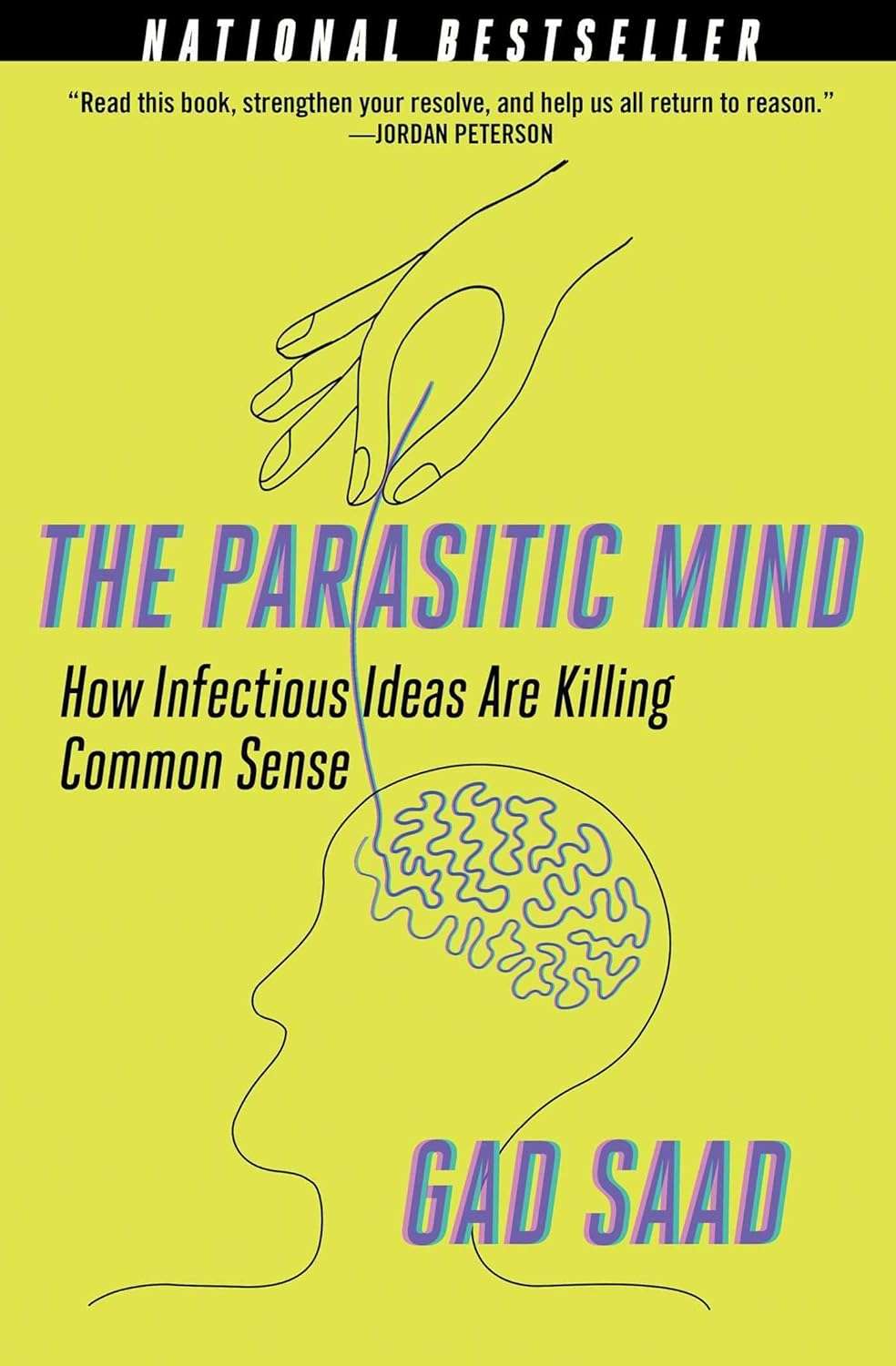Description
Book: The Parasitic Mind by Gad Saad
The Parasitic Mind: How Infectious Ideas Are Killing Common Sense by Gad Saad is a bold and thought-provoking exploration of the modern world’s intellectual landscape. With a focus on the dangers of ideological rigidity and the growing influence of “parasitic” ideas, Saad takes readers on an eye-opening journey through the realms of culture, politics, and science, challenging deeply held beliefs and calling for a return to reason and critical thinking.
Story Overview
In The Parasitic Mind, Gad Saad, an evolutionary psychologist, argues that the world has been increasingly influenced by irrational and harmful ideologies—what he refers to as “parasitic ideas.” These ideas spread through society like a virus, undermining reason, critical thinking, and common sense. Saad examines how these ideas take root and propagate in culture, education, politics, and media, and he warns that they are eroding the foundations of logical discourse and free thought.
Drawing from his background in evolutionary psychology, Saad explains how certain ideological beliefs—such as radical political correctness, identity politics, and social justice movements—can be seen as “parasitic.” These ideologies thrive on emotion rather than reason and often manipulate individuals into adopting ideas that are not based on evidence or rationality. Saad’s central thesis is that these ideas are dangerous because they infect people’s minds, making them resistant to facts and logic.
The book also offers a compelling critique of modern academia, where Saad believes many institutions have become breeding grounds for intellectual conformity, cancel culture, and the rejection of open debate. He uses his own experiences as a professor to illustrate how academic freedom and rational inquiry are increasingly under attack by these ideologically driven forces.
Key Themes and Concepts
- The Spread of Parasitic Ideas: Saad defines “parasitic ideas” as ideologies that take root in people’s minds, often without logical or empirical evidence to support them. These ideas spread through culture and society, undermining rational thinking and critical analysis. Saad argues that these ideas function like viruses, infecting people’s minds and distorting their ability to reason effectively.
- The Erosion of Common Sense: One of the book’s central themes is the gradual decline of common sense in contemporary society. Saad argues that much of the irrationality we see today—especially in politics, media, and academia—can be attributed to a rejection of basic, evidence-based reasoning in favor of ideology-driven narratives. He emphasizes the importance of common sense as a defense against this intellectual decline.
- The Role of Ideology in Shaping Behavior: Saad delves deeply into how ideologies—especially those driven by extreme political correctness, victimhood narratives, and collectivist thinking—affect behavior and society at large. He critiques how these ideologies promote a culture of hypersensitivity, censorship, and the suppression of free speech, making it difficult for people to engage in open, rational discussions.
- The Importance of Free Speech and Open Debate: A key argument in The Parasitic Mind is the need to protect free speech and encourage open, honest debate. Saad contends that the suppression of free expression, often under the guise of social justice or political correctness, is one of the most dangerous consequences of parasitic ideas. He believes that it is only through robust discussion and the challenging of ideas that societies can grow intellectually and morally.
- The Intellectual War Against Common Sense: Saad draws attention to what he sees as an ongoing war against reason, common sense, and objectivity. He argues that certain movements and ideologies are actively working to replace evidence-based reasoning with emotion-driven, subjective viewpoints, thus creating a cultural environment where truth is relative and often discarded in favor of ideological conformity.
- The Power of Rational Thinking: At the heart of The Parasitic Mind is a call for a return to rational thinking, evidence-based reasoning, and intellectual honesty. Saad stresses the importance of questioning ideas, engaging with opposing viewpoints, and being willing to change one’s mind when presented with new evidence. His advocacy for intellectual humility and critical thinking is a key message of the book.
Why You Should Read The Parasitic Mind
- Challenging the Status Quo: If you’re frustrated by the rise of ideologies that seem to undermine reason and common sense, The Parasitic Mind offers a critique of these movements, backed by scientific research and Saad’s personal experiences. The book challenges prevailing narratives, making it a thought-provoking read for those who want to explore deeper questions about the direction of society.
- Clear, Engaging Writing: Saad’s writing is both accessible and compelling. He uses humor, vivid examples, and personal anecdotes to engage readers, making complex ideas understandable for a broad audience. Whether you’re well-versed in psychology or simply interested in intellectual discourse, Saad’s style is approachable and engaging.
- A Call for Critical Thinking: The book is an impassioned plea for the importance of critical thinking, intellectual honesty, and evidence-based reasoning. Saad encourages readers to question their beliefs, engage in debates, and resist ideologies that suppress free thought. This emphasis on rational inquiry is particularly valuable in an era where many people are becoming more polarized and resistant to differing opinions.
- A Defense of Free Speech: As free speech continues to come under attack in various spheres of society, Saad’s defense of open discourse and the free exchange of ideas is timely and important. The Parasitic Mind emphasizes the necessity of preserving free speech as a cornerstone of democracy and intellectual development.
- Relevant for Contemporary Issues: The Parasitic Mind is particularly relevant in today’s climate of political correctness, cancel culture, and the growing influence of social justice movements. Saad’s analysis of these issues provides an intellectual framework for understanding the complexities of contemporary social and political conflicts.
Conclusion
The Parasitic Mind by Gad Saad is a powerful and timely book that exposes the dangers of ideological extremism and the erosion of rational thought in modern society. Through his critique of parasitic ideas and his call for a return to reason, Saad provides readers with a fresh perspective on the intellectual challenges of our time. Whether you’re concerned about the suppression of free speech, the rise of cancel culture, or the rejection of science and common sense, this book offers valuable insights into how we can reclaim our intellectual independence and critical thinking.













Reviews
There are no reviews yet.